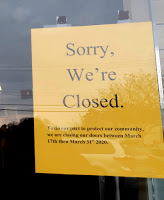Coronavirus will devastate regional economy
 The large federal presence in the Washington, D.C., region will not insulate the region’s economy from an economic downturn caused by the coronavirus pandemic.
The large federal presence in the Washington, D.C., region will not insulate the region’s economy from an economic downturn caused by the coronavirus pandemic.
The economic impact in the D.C. region “will mirror the trajectory of the U.S.,” states an analysis published March 18 by the Stephen S. Fuller Institute at George Mason University’s School of Policy and Government.
The report predicts the national economy will contract 0.2 percent in 2020. Activity would rebound in the first quarter of 2021, rising 3.3 percent, when households and businesses resume normal spending patterns,
The effects nationwide will be the most pronounced for service industries that rely on discretionary spending and those that have strong international ties, especially business that rely on international manufacturing, the report states.
The Washington region’s businesses are modestly less dependent on international manufacturing and are better positioned for their workers to work remotely, so the pattern of economic decline differs slightly.
However, unlike typical recessions, the federal government isn’t going to be a stabilizing force for the regional economy during the coronavirus pandemic – Federal workers are reducing their spending at local business just like everyone else.
The main factor in the region’s economic slowdown will be the decline in consumer spending, primarily for restaurants, entertainment, retail, and personal care services, the report states.
When service businesses can resume normal operations, it predicts, local consumers will return incrementally but business and leisure travel will likely stay below pre-pandemic levels for another one or two quarters.
With regard to the tourism industry, the report says the pandemic will have an even greater impact than the 9/11 attacks. The loss to the hotel industry in the region could be $630 million. Decreased spending from travelers, plus the indirect effects of lost earnings, could amount to an additional $600 million in lost economic activity.
When retail, restaurant, and other service-oriented businesses resume normal operations, most likely in the third quarter, the report states, “the pent-up demand for these services will increase local consumer spending beyond what would have occurred during a normal period, but it will not fully compensate for the lost revenue during the first and second quarters.”
That’s because consumers won’t be able to double-up on some activities. For example, if someone misses a regular haircut in the spring, they’re not going get two haircuts in the fall. Also, the net wealth of households will decline because of lost wages and shrinking investments.
Service workers in industries that rely on discretionary spending will be hardest hit in terms of wage reductions and layoffs. These workers are also likely to be low-income households and less able to compensate for lost income through savings or wages from other household members.
The increase in the numbers of workers teleworking during the pandemic is likely to lead to reduced productivity, the report adds.
If social distancing measures are still in place past June 2020, the economic losses will be compounded, the report states. “The longer the pandemic continues, the more likely it is that total household income in the region will decrease significantly enough to suppress the consumer spending post-pandemic, subsequently delaying the economic recovery.”
